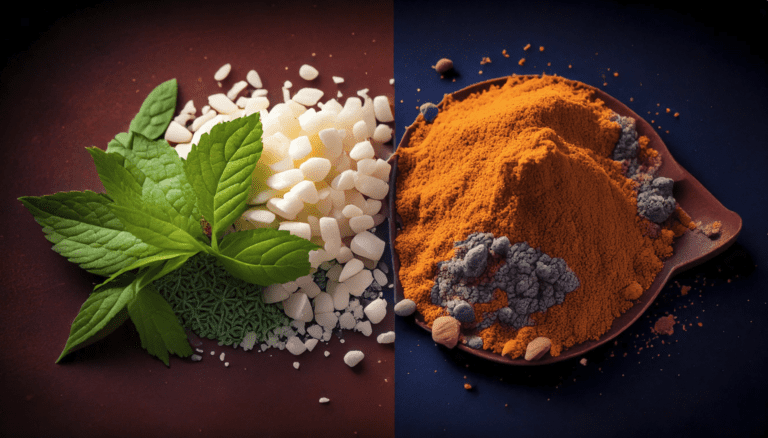Managing blood sugar levels is a constant concern for diabetics, and many turn to natural sweeteners like erythritol and stevia as sugar substitutes. But when it comes to erythritol vs stevia for diabetics, which sweetener is the better option? Both are popular in the health community, but they work differently in the body. This article will compare erythritol and stevia, diving into their pros, cons, and effects on blood sugar control, so you can choose the one that fits your dietary needs.
Both erythritol and stevia offer benefits for those who need to control their blood sugar levels, but which one is better for diabetics? While both are low in calories and do not impact insulin levels, they differ in taste, side effects, and overall health benefits. This article provides a detailed comparison of erythritol vs. stevia, highlighting which might be the healthier option for diabetics and why.
Summary
Erythritol vs Stevia for diabetics: Erythritol and stevia are both excellent sweeteners for diabetics as they have zero impact on blood sugar levels. Erythritol offers a mild, sugar-like taste and is ideal for baking, while stevia is much sweeter and has potential health benefits like lowering blood pressure. Both are safe alternatives to sugar, but personal preference on taste and digestion tolerance will determine the better option
What is Erythritol?
Erythritol is a sugar alcohol often used in diabetic-friendly products because it has no impact on blood glucose levels. This makes it an ideal sweetener for diabetics. It’s about 70% as sweet as sugar and contains almost no calories, making it a popular ingredient in low-calorie and sugar-free foods.
Benefits of Erythritol for Diabetics
Erythritol does not cause a spike in blood sugar or insulin levels, a key benefit for diabetics. Studies have confirmed that it can be safely used by people with diabetes without impacting their blood glucose control.
Drawbacks of Erythritol
Despite its benefits, some people experience digestive issues like bloating and gas when consuming erythritol, particularly in larger quantities. This may be a concern for diabetics with sensitive digestion.
Erythritol’s Impact on Blood Sugar
Erythritol is especially popular among diabetics because it has no significant effect on blood sugar or insulin levels. Unlike sugar, which is rapidly absorbed and spikes blood sugar levels, erythritol is absorbed into the bloodstream and excreted unchanged in the urine. This makes it an ideal sugar substitute for those managing diabetes, as it won’t trigger an insulin response.
Several studies support erythritol’s benefits for diabetics. For example, a study published in the Journal of Nutrition found that erythritol consumption did not raise blood glucose or insulin levels, making it a safe option for people with diabetes or metabolic syndrome. Additionally, erythritol does not contribute to tooth decay, another plus for diabetics who may be more prone to dental issues.
Potential Side Effects of Erythritol
Despite its benefits, erythritol does have some drawbacks. Because it’s a sugar alcohol, it’s not fully absorbed by the body, which means it can ferment in the intestines, potentially leading to digestive issues like bloating, gas, and diarrhea. These side effects are more likely when erythritol is consumed in large quantities. However, many people tolerate erythritol better than other sugar alcohols like xylitol or sorbitol, which are more likely to cause digestive discomfort.
What is Stevia?
Stevia is a natural sweetener derived from the leaves of the Stevia plant, known for being 200-400 times sweeter than sugar. Stevia contains no calories and has a zero glycemic index, meaning it does not affect blood sugar levels, making it a popular sweetener for diabetics.
Benefits of Stevia for Diabetics
Stevia is often seen as a healthy alternative to sugar because it is plant-based and doesn’t impact blood sugar. Some research even suggests that stevia may help lower blood pressure and cholesterol, offering added health benefits for diabetics.
Drawbacks of Stevia
One potential drawback is stevia’s taste, which some people describe as having a slight bitterness. Additionally, overly processed stevia products may contain additives that dilute its natural benefits.
Erythritol vs. Stevia: A Detailed Comparison
When comparing erythritol vs stevia for diabetics, it’s crucial to consider how each sweetener affects blood sugar, digestion, and overall health.
| Criteria | Erythritol | Stevia |
|---|---|---|
| Calories | Zero | Zero |
| Blood Sugar Impact | None | None |
| Digestive Issues | Possible bloating | Rare |
| Taste | Mildly sweet | Can be bitter |
| Origin | Sugar alcohol | Natural plant extract |
| Usage | Baking, beverages | Sweetener for drinks, foods |
| Aftertaste | None | Possible bitter aftertaste |
For diabetics, both erythritol and stevia provide excellent alternatives to sugar, but they work differently in the body.
Taste and Usage
One of the biggest differences between erythritol and stevia is taste. Erythritol has a taste profile that is more similar to sugar, with a mild sweetness and no aftertaste. This makes it an excellent choice for baking and other culinary uses. Stevia, on the other hand, is much sweeter than sugar and can sometimes have a bitter aftertaste, especially when used in larger quantities. However, this intensity allows you to use very small amounts, making stevia highly efficient in sweetening drinks and foods.
Digestive Tolerance
While both sweeteners are generally safe, erythritol can cause digestive issues like bloating and gas, particularly when consumed in large amounts. This is due to its classification as a sugar alcohol, which can ferment in the intestines. Stevia, being plant-based, is less likely to cause digestive upset, making it a better option for those with sensitive stomachs.
Which Sweetener is Better for Diabetics?
When choosing between erythritol vs stevia for diabetics, the right choice often comes down to personal preference. Both sweeteners are zero-calorie and don’t raise blood sugar levels, which is crucial for managing diabetes. However, there are a few factors to consider when choosing the right sweetener.
- If you’re looking for a more sugar-like taste with minimal aftertaste, erythritol may be the better option. It’s also a great choice for baking, as it mimics the texture and sweetness of sugar without affecting blood glucose.
- If you’re more concerned about digestive health, stevia might be the better choice. Since it doesn’t ferment in the intestines, it’s less likely to cause bloating or gas. Additionally, stevia’s potential benefits for blood pressure and cholesterol make it a healthy option for those managing other health conditions alongside diabetes.
Ultimately, both sweeteners are safe for diabetics, and the choice often comes down to taste preference and tolerance.
Can You Use Both Together?
Combining erythritol and stevia has become increasingly popular, as these sweeteners complement each other’s strengths and weaknesses. Erythritol helps to balance stevia’s bitterness, while stevia enhances erythritol’s sweetness, reducing the amount needed. This makes erythritol-stevia blends an excellent option for people who want to minimize side effects and enjoy a balanced sweetness.
Many commercial sweeteners use this blend to create a more versatile product that can be used in baking, beverages, and desserts without compromising taste or health benefits. For diabetics, using both sweeteners together may provide a more enjoyable sweetening experience while keeping blood sugar stable.
Conclusion: Erythritol vs Stevia for Diabetics
When it comes to choosing between erythritol vs stevia for diabetics, both sweeteners offer unique benefits. Erythritol provides a more sugar-like experience without impacting blood sugar levels, making it great for diabetics who want to bake or cook. On the other hand, stevia’s natural origins and potential health benefits make it an excellent choice for those who prefer a plant-based alternative. Whichever you choose, both sweeteners are safe for diabetics and provide a healthier alternative to sugar.
FAQs
Can erythritol and stevia be used together?
Yes, many products combine erythritol and stevia to balance sweetness and minimize any potential side effects, such as digestive discomfort or bitter aftertaste.
Is erythritol safe for diabetics?
Yes, erythritol does not raise blood sugar levels or insulin, making it a safe sweetener for people with diabetes.
Does stevia have any side effects?
Which sweetener is better for baking?
Erythritol is often preferred for baking because it behaves similarly to sugar in terms of sweetness and texture.
Sources and Citations
Erythritol and Blood Sugar Levels
Erythritol is a sugar alcohol that is often used as a sweetener in diabetic-friendly products. It is absorbed slowly by the body, leading to minimal increases in blood sugar levels.
Journal of Nutrition
Stevia and Blood Pressure Regulation
Stevia is a natural sweetener derived from the Stevia rebaudiana plant. In addition to its potential benefits for blood sugar control, stevia has been shown to have a positive impact on blood pressure regulation.
Journal of Clinical Endocrinology & Metabolism
Sweeteners and Diabetes Management
The National Institute of Diabetes and Digestive and Kidney Diseases (NIDDK) has conducted research on the use of sweeteners in diabetes management. They recommend that individuals with diabetes consult with their healthcare provider to determine the most appropriate sweetener based on their individual needs and goals.
NIDDK





